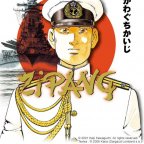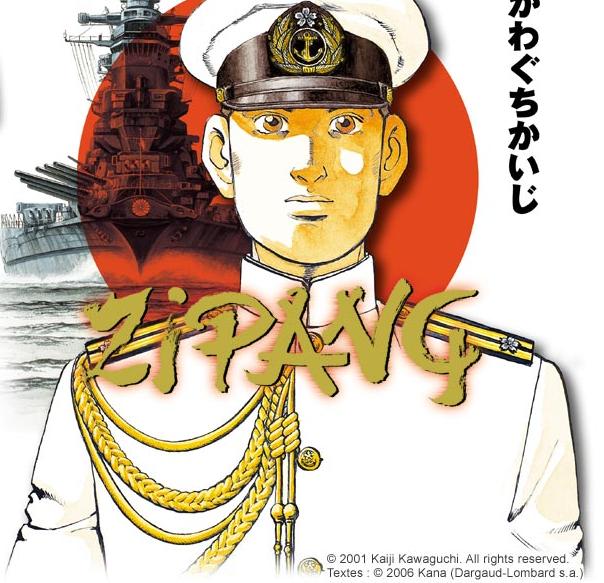Zipang and WW2
Zipang, or Zipangu, or Jipangu, or however you think it should be spelt, is the ancient European name for Japan. It was believed by foreigners to be a land of immense wealth and the name carries a somewhat mythical association.

Zipang the anime is about Mirai, an AEGIS class cruiser belonging to the Maritime Self Defense Force (de facto Navy of modern Japan), travelling 60 years into the past by accident while in the middle of a joint military exercise in the Pacific. The ship found itself right in the middle of Japan’s attack on Midway in the Pacific theatre of WW2.
While the setting sounds horribly like a sorry excuse for nationalistic right-wing propaganda (id est, Raimuiro Senikitan), it really isn’t. Instead of joining the Imperial Japanese Navy and pwning the hell out of the Americans like you would expect, Mirai maintains its neutrality while trying its best to preserve the paths of history and find a way back to the future.
Though Mirai has a crew of 240, the story mainly revolves around a few key characters and how they, as the generation that has never witnessed war, deal with the realities of the most brutal war man has ever fought.
If you are looking for adrenaline-filled WW2 battles, you’ll not find any here. Even Midway, the turning point of the whole Pacific War, is only given a cursory coverage. What you will get instead is a modern but distinctively Japanese perspective of WW2 and Japan’s great imperialist ambition. Indeed, Zipang is a WW2 show that has way more talking than shooting.
Zipang tries to humanize both the Japanese and American sides, though it does it better for the Japanese side (well duh). The show tries to create a more authentic feel by introducing real historical characters, although the way they are portrayed is probably far from reality.
The important decision makers on the Japanese side are divided into two main factions: those who instigated and advocate war and those who oppose war but comply out of loyalty to the nation. Zipang carries a clear anti-war message that depicts the former as irrational, self-serving and not truly doing things for the sake country like they claim to be, while the latter is portrayed as far-sighted and wise.
The unwilling participants of war, such as Admiral Yamamoto, welcome Mirai as a sign of Japan’s recovery. They know that the war has long been lost but yet they cannot disobey orders. They take comfort in that fact that Japan’s defeat will ultimately serve as the starting point of a much more powerful and rich nation than Imperial Japan ever was. They want peace but they, honour-bound as soldiers of the Empire, can do nothing but fight on.
The war hawks believe that they can win the war, despite the odds against Japan. They see Mirai as a threat to the war effort because it embodies the defeat of Imperial Japan. They are more or less portrayed as the antagonists in the show.
I think that as a whole, Zipang does a great job avoiding the traps of conventional WW2 films. It does not seek to glorify war by colouring the world in black and white, neither does it go into the other extreme and be anti-war for the sake of it by showering you with deaths and violence. Instead, Zipang utilizes the personalities of its main characters to present to you the various Japanese perspectives of WW2 and also how the main characters who have been brought up in peacetime respond to the ugly realities of a war.
I think the three scenes that left the deepest impressions are:
Spoiler Alert |
It’s quite a thoughtful show and I would recommend you to give it a chance. That ends the pseudo-review section of this entry, now for the rantage.
Modern Japan and WW2
Zipang is a perfect example of what is often misunderstood about modern Japan’s perspective of WW2. With all the media’s attention focused on the Prime Minister’s visits to Yasukuni shrine, the censorship of history textbooks and the general portrayal of Japan in Asian WW2 films, many Asians today believe that Japan’s refusal to face its ugly past is a dangerous step towards a new wave of Japanese militarism and nationalism.
The truth is that, most Japanese people are starkly anti-war, probably even more so than USA and China. Japan in WW2 was a brutal and inhuman oppressor in the eyes of most of East Asia, but those atrocities only represent a very tiny portion of WW2 as a whole, at least from the Japanese perspective. A Japanese is more likely to remember WW2 for Hiroshima, the intense fire-bombing of Tokyo or the heavy losses incurred by both sides during the island-by-island attrition warfare in the South Pacific.
The Japanese are anti-war because of their own sufferings in WW2. They too have learnt first-hand the horrors of war and the insanity of those who advocate it. When Americans landed in Okinawa, civilians killed their own families and committed suicide in other to escape torture at the hands of the Americans, because they were fed lies by the military government. Young boys were brainwashed into blood-thirsty soldiers who were told to fight to the death for a war that Japan had clearly no hope of winning since Pearl Harbor. Nearly half of Tokyo was razed in the fire-bombing campaign in the final months of WW2. Japan also became the first and only victim of the atomic bomb.
Indeed, Japan today is one of the most anti-war nation on the planet. There are plenty of right-wing extremists of course, but the nation of Japan as a whole is unlikely to be of any threat to the rest of Asia again. Just look at how long it and how much effort it took for the government to justify SDF’s involvement in Iraq’s reconstruction, and even then most Japanese are still strongly against SDF’s presence in a foreign nation.
Paradoxically, the very thing that makes the Japanese people love peace is also what’s causing the anti-Japanese sentiments in China and South Korea. The Japanese view of WW2 is too neutral and too morally irresponsible.
The ugly roles of that Hitler and fascism played during WW2 have been driven into the German national identify from the ground up. The German people gain their respect for peace by understanding both their own sufferings, such as in Dresden, and the sufferings of those who were victimized by the German war machine, such as the Holocaust. Both sides belong to the same coin and Germans learn about WW2 in its entirety and thus gain a respect for peace.
Japan on the other hand, has grossly overlooked the flip side of the coin. Japan’s own suffering during WW2 is overly-emphasised and the rest of Asia is all but forgotten. Japan’s starch anti-war sentiments come not from a balanced understanding of the horrors of war but from its own sufferings. Imagine if a German history textbook on WW2 talks about the carpet bombing of Dresden in great details but skims over the Holocaust. The reader will no doubt still conclude that war is a terrible thing, but it would be due to an entirely different reason. That is what is happening in Japan now.
The Japanese people are peace-loving and reasonable people just like everyone else, but the moderates in power clearly need to get themselves a stronger voice and a backbone. If they continue to fail to do so, what the rest of Asia perceives of Japan will be represented by the the right-wing extremists who threatened the Japanese publisher of The Rape of Nanking, the colourful military history of Japan as told by the war museum in Yasukuni shrine, and the history textbooks that refer to South-east Asia as nothing more than a resource node in a war game.
In America, you can find publications that slam the Vietnam War and documentary films that talk about the My Lai massacre. In German, children learn about the horrors of Holocaust in school. Where are you now, Japan? Where indeed.
Dear Japan, please stop letting the right-wing nutcases do the talking if you want to be heard by the rest of Asia.
On the other hand, as I have said early, Japan today is clearly not a military threat to anyone, neither does its people have the intention of repeating WW2 again. Chinese and Korean right-wing nutcases need to chill out and tone down the anti-Japanese rhetorics that are only going to help the Japanese nationalists gain more power and influence over their moderate counterparts.
Gah… too sleepy to rant anymore.












September 3rd, 2006 at 7:08 am
Interesting discussion. This reminds me of that movie with Martin Sheen where a modern-day US aircraft carrier gets sent to the attack of Pearl Harbor and has to decide whether to use its squadrons of F-14s to stop the Japanese attack.
One point I’d like to make is that the decisive battle wasn’t Pearl Harbor, but the Battle of Midway. Admiral Yamamoto theorized that if the US Navy was allowed to linger, then the American industrial production capability would eventually overwhelm the Japanese Navy. If the US had lost it’s 3 remaining aircraft carriers in that battle, then the Japanese would have been poised to take over all of the Pacific and leave whatever ships the US built after with no room to manuever.
Onto current day, the experience of the horror of war is pretty frightening, but probably really only to those who have actually experienced it. I have to wonder what Germany and Japan will think a few more generations down the line when the ones who experienced WWII are no longer around. Even 1 generation is enough of a gap sometimes. Take US President Bush I who was more contemplative about Desert Storm and not pushing into Bahgdad (some of which was shaped by his experience in the Navy) and Bush Junior who leaped at the chance to invade Iraq after 9/11 (who with no wartime experience thought the invasion would be a 6-month affair). I just takes a few influential or powerful people to change a nation’s notion of war.
September 3rd, 2006 at 9:27 am
Actually, no, I don’t think that even if Japan destroyed all 3 of the United States’ carriers and ground facilities at Pearl Harbour they would have won at the end. As Admiral Yamamoto said, (or as reported in Tora! Tora! Tora!) he could only promise no American intervention for 1 year. After that he could not guarantee anything.
You see, although Japan managed to get rid of American naval power in the Pacific with Pearl Harbour, America’s industries can pump out waaaay more stuff than Japan could ever possibly have. After the battle of Midway, (correct me if i’m wrong) America pumped out 11 new carriers. Yes folks, ELEVEN. In a way, the loss of an American carrier is actually not as damaging to America as the loss of a Japanese carrier is to Japan. Japan could not replace the carriers it lost until early 1945, I think. So, an American defeat at Midway would not have led to Japan’s victory. It would only have lengthened the war.
Then you might ask, why, why would Japan still choose to attack America knowing this very well? Because the Army generals believed that America would be shocked by the terrible losses they were suffering and withdraw from war. But no, American sentiment at that time was something like ‘I’m gonna make those bastards pay good.’ So, yeah, Japan was sort of doomed from the start to lose.
But enough with the history debate, I agree, all the militarists need to shut up, and people ought to find out more about each other’s culture before they denounce others. OMG Japanese visiting Yasukuni shrine! They want to go back to a militarist past! They think they are not responsible for our suffering during WWII! Let’s protest against these bastards!
Yeah, people are fast to condemn another party without knowing everything behind his/her actions. Like they say, it’s always easier to shoot an enemy soldier you don’t know, because it is always easier when you can criminalise him and judge yourself righteous for shooting him.
September 3rd, 2006 at 12:57 pm
> On the other hand, as I have said early, Japan today is clearly not a military threat to anyone, neither does its people have the intention of repeating WW2 again.
Its “… as I have said earl(ier)”.
September 3rd, 2006 at 7:15 pm
Kongo-class destroyers do not carry Tomahawk cruise missiles.
September 3rd, 2006 at 8:06 pm
Mirai is a Yukinami-class Aegis essort vessel. Fictional.
September 3rd, 2006 at 8:07 pm
Before the serious and ranty stuff – I’d like to point out that since the Kongos are practically twins of the Arleigh Burke-class AEGIS destroyers deployed by the USN their Verticle Launch System cells can easily carry (or be modified back to carry) Tomahawks and Harpoons in addition to Standards. They simply don’t carry them due to the MSDF’s supposedly peace-loving mission, which is pure rubbish. What good is a squadron of billion-dollar destroyers good only for shooting down cruise missiles (and maybe planes) without a single potent antiship weapon?
While I personally believe that the Japanese need to be urgently re-educated about the events surrounding the Pacific War (as it is known in the Japanese language), it simply isn’t going to happen anytime soon or easily because of the way Japanese politics are. The ruling Liberal Democratic Party (LDP) itself is split into many factions, undoubtedly with varying views on the matter. The fact that the three candidates for the LDP presidency have varying statements w.r.t the shrine and visits to it is testament to this. This is not forgetting that a substantial part of the opposition is very much right-wing, shall we say. Nothing can be done without a strong Prime Minister and education minister with a common will to set things straight.
No matter how peace-loving the Japanese may be, it is high time it asserts its rightful political influence and authority in East Asia, as the world’s third largest economy and Asia’s largest. More to the point, Japan is the only bastion of the free world (screw Korea and the slight over-dramatization) in the region, and it is necessary to if not check China, then to exert a stabilizing influence. ASEAN is crap, not to mention rapidly turning into a Chinese puppet, and India is too embroiled in its internal struggles to matter anytime soon – that really just leaves Japan with its Security Pact with the United States and its own barely-respectable Self-Defense Forces, Case in point: Japan needs to enter into a strategic defence pact with Korea, strengthen defence relations with the USA, and build up its military (to hell with the SDF crap). As Bridge Bunny has said earlier – Kongo-class AEGIS destroyers, the flagships of the MSDF, don’t carry Tomahawks (or even Harpoons, if my information’s up to date), which are basically 1970s-era antiship missiles. The MSDF is practically a frigate navy in a MARTIME ISLAND NATION with the greatest potential threat to the whole of East Asia for the next century several hundred miles to its west and THOUSANDS of miles away by sea from its most important strategic ally to the east.
Put it simply – build carriers (coooperate with the Brits and Frenchies on their little project?), a decent, state-of-the-art air force (just join the JSF program), and more submarines (a couple of Virginias or something would be nice; alternatively build more Oyashio-class diesel boats), and place the Home Islands under decent anti-air coverage from Patriot batteries (like Korea; alternatively build more AEGIS ships). Gain the ability to project force across the air and oceans, and Japan might be at least somewhat safe for a while. At least, till the last war of modern man is fought (no bets on who starts it), paving the way for Armageddon or a new, postmodern era. Until then, continue to enjoy anime. While we all can.
September 3rd, 2006 at 8:38 pm
AEGIS are practically offensive weaponry. Placing several AEGIS platforms off the coast of a hostile nation practically denies them use of air power.
Kongo’s do carry Harpoons. And since the SLAMs (Standoff Land Attack Missiles) use the Harpoon’s body, I don’t see them not being adapted for shipboard use and used as cheap cruise missiles.
September 3rd, 2006 at 9:16 pm
To say that China is a threat to Asia is the same as saying America is a threat to the world.
I think you need to stop thinking of the world as a war game, because it really becomes one when everyone thinks that way.
September 3rd, 2006 at 10:02 pm
Uh… the range of the Standard is less than a hundred miles, I believe. The protective ‘bubble’ that a frigate navy can generate has a radius of somewhere around that. AEGIS hardly projects power without a carrier for the offensive punch. Ask any expert on military doctrine or check out some think-tanks for confirmation.
Anyway, what are we but pawns in this gigantic board game we call ‘the world’? To say the world is nothing more than a game is hardly far from the truth, is it?
This calls for more Chardonnay. Care to join me?
September 4th, 2006 at 3:52 am
The fact that Japan loves peace for the wrong reasons like its own one-sided suffering demonstrates the world needs to be vigilant of its actions. For they loved peace because they suffered from the war, from atomic bombs, but of course, others don’t matter. Especially Asian countries that have suffered thanks to Japan.
It’s very likely that should Japan have won WWII, it would have gladly wiped its conquered countries off the face of Earth. Japan has today became the most advanced nation in East Asia, history tends to repeat itself, who know what Japan may be capable of once it gain enough power to wage war once more? And what does that commenter mean who said that Japan has the duty to “exert a stabilizing influence” on others? I am sure it is such a splendid idea to let a nation who waged wars, murdered and raped to watch others. Blah.
September 4th, 2006 at 9:17 am
“It’s very likely that should Japan have won WWII, it would have gladly wiped its conquered countries off the face of Earth.”
Yes, lots of conquerers do that. Spanish to the Aztecs, i think (some South American people, can’t remember, but i remember the spaniard leader was cortez or something). But that is only logical. When the conquering population is smaller than the conquered population, you massacre the conquered to keep the balance so they don’t rise up and overthrow you.
“History tends to repeat iteslf, who know what Japan may be capable of once it gain enough power to wage war once more?”
Well, considering that as long as they know that war causes them suffering (even if they don’t know that they cause others suffering), they are unlikely to start a war. That is, until they forget, which will happen to people around the world sooner or later. I mean, look at the current generation of kids. We have games like Red Alert, Rome: Total War, and stuff like that. Yeah, war is cool. Violence is cool. It’s happening all over the world. (well, maybe only in developed countries, but that doesn’t really matter :P) So, going by what you say that Japan may wage war once it gains enough power to do so, ANY country with sufficient military power has an equal chance of doing so. The main thing that makes people anti-war is the fact that they know they THEMSELVES suffer, not that they cause others suffering.
“I am sure it is such a splendid idea to let a nation who waged wars, murdered and raped to watch others. Blah.”
You are judging people for what they once were. The political climate has changed, the people have changed. Although we must never forget, we cannot blame them for their parents’/grandparents’ actions. It’s like saying Americans are a lousy people who like going around thrashing other people’s homes. That is what the American military is doing. But is that a true representation of the typical American? I think not. The Americans that I know are nice and truly welcoming people. So judge a person for what they are, not by their nationality or race, or YOU will likely be the one to start the war again.
September 4th, 2006 at 1:41 pm
… I am amused by the ongoing debate with relation to the anime in question.
I don’t really need to go into the power plays of the world (yes, the true phrase is “power plays”) because sooner or later, those right-wing idealists will inherently go the way of “Ozymandias,” so to say.
As for me, I will sit on the sidelines as a witness and an observer, and I will sip a cup of Earl Gray tea while watching the events that are unfolding in the global theatre. Kinda like becoming a Gaulin, sans the madness.
It’s good when you have a Stoic mind.
September 5th, 2006 at 2:32 am
How’d you take screenshots in this matter, by the way?
May 4th, 2007 at 7:18 am
Country does not lead it’s people to war, Politicians do so…
May 4th, 2007 at 7:38 am
WW2 in pacific is caused by Japan’s Prime Minister to conquer parts in asia with the emperor’s blessing. First, they conquered Korea and Manchuria to boost their resources, crew and soldier..(actually, my grandfather said that soldiers from Japan who came here majority was Koreans and Chinese and small quantity of Japanese… (Maybe japanese speaking koreans. boys in korea were brainwashed by japan. then why would my grandfather know it?? because he actually interacted with them.. my grandmother in other side of my family married japanese. so i have 1/4 japanese blood).. japan could have not done this devastation in pacific without that Japan’s Prime Minister and it’s Generals. I would have not been born without WW2, hehehehe….
Trackback from
bella modaJune 8th, 2007 at 2:02 am
bella moda…
Reviews on bella moda….
Trackback from
‘War Sucks!’ « The AnimanachronismMarch 21st, 2009 at 2:04 am
[...] respect) in this post, and it might be worth reconsidering that in the light of DarkMirage’s comments on pacifism in [...]